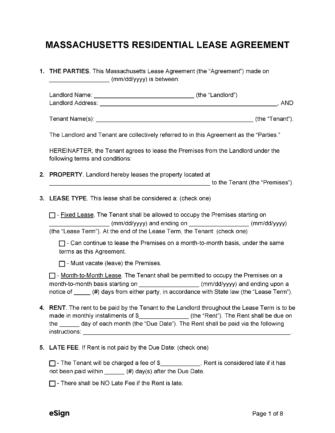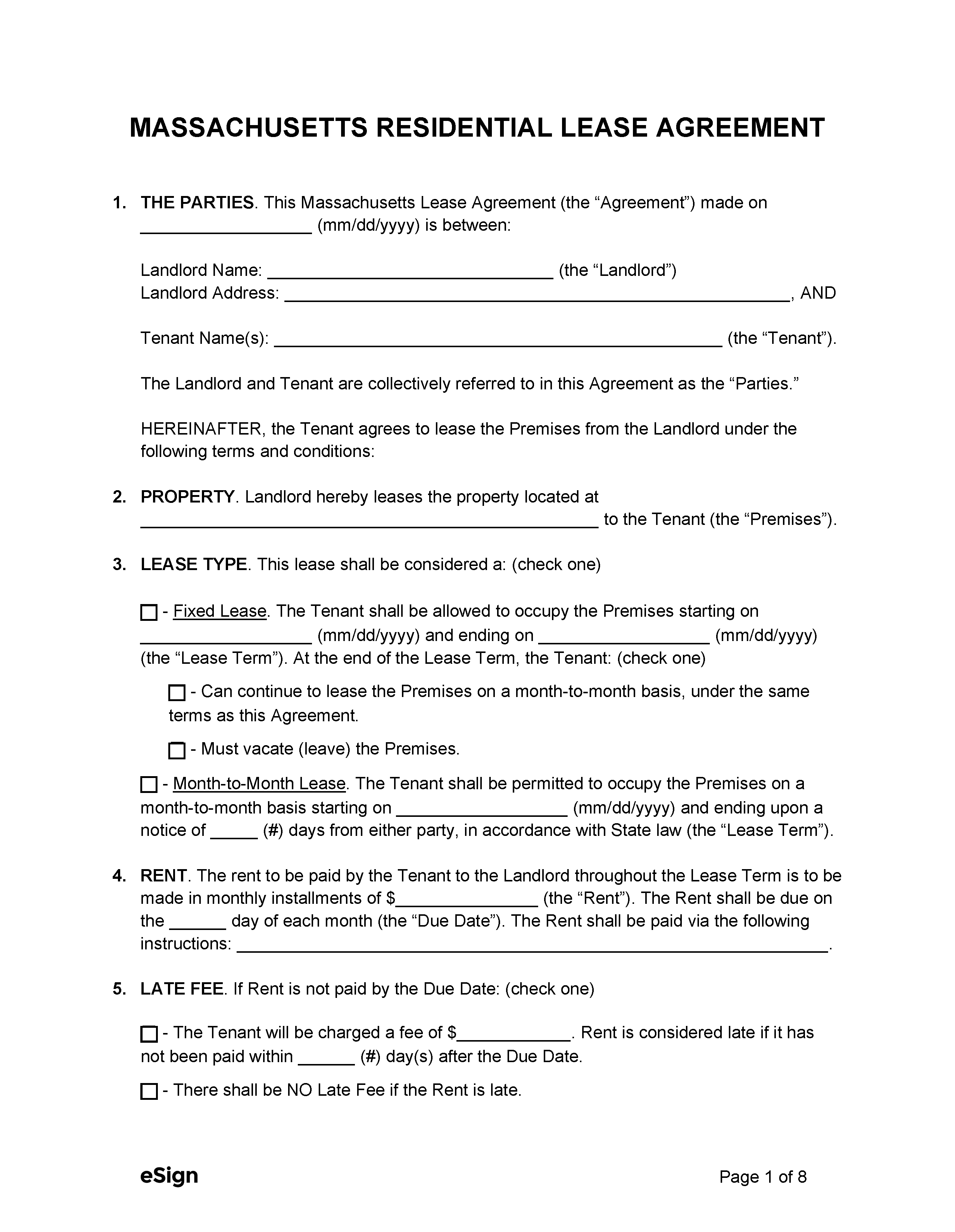Lease Agreements: By Type (6)
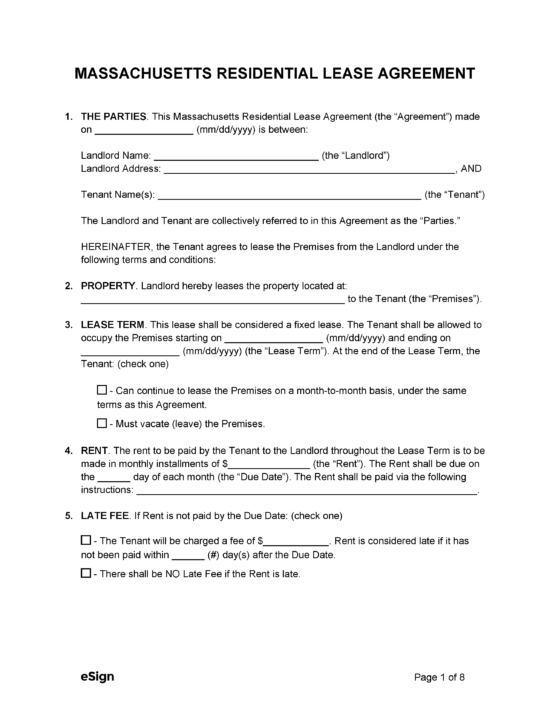 Standard (1-year) Lease Agreement – A one-year lease, the most commonly used agreement, enables a tenant to rent residential property, usually with the option to renew at the end of the term. Standard (1-year) Lease Agreement – A one-year lease, the most commonly used agreement, enables a tenant to rent residential property, usually with the option to renew at the end of the term.
Download: PDF |
Commercial Lease Agreement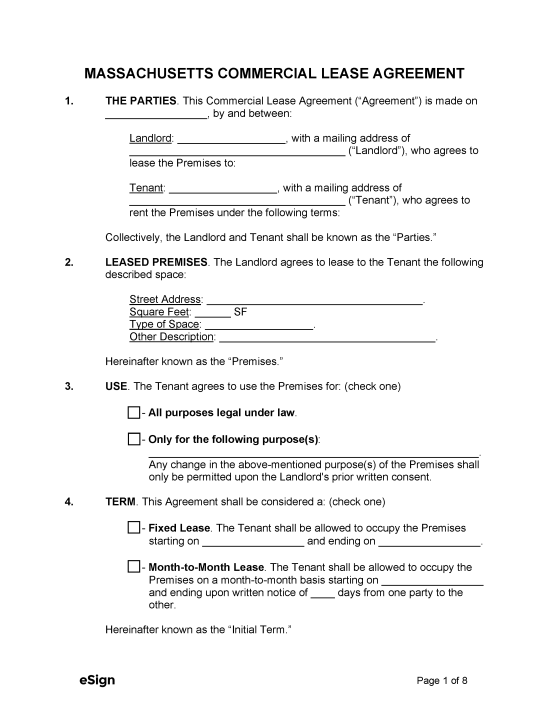 – A commercial lease agreement is used for renting out non-residential property to business owners. – A commercial lease agreement is used for renting out non-residential property to business owners.
Download: PDF, Word (.docx), OpenDocument |
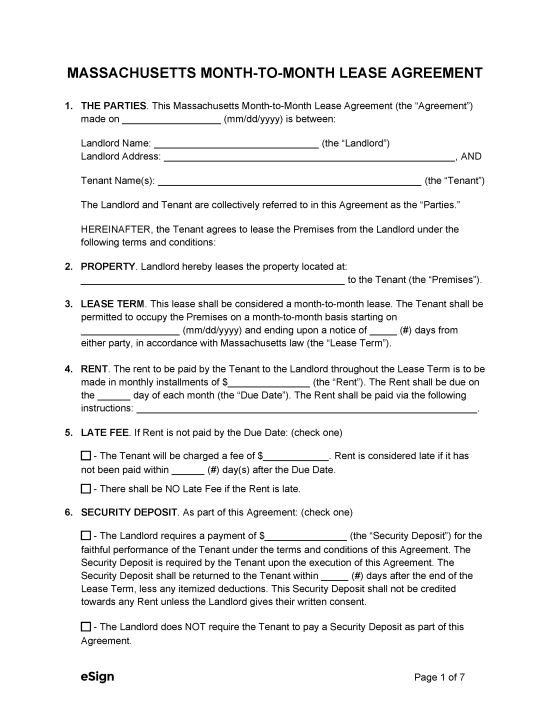 Month-to-Month Lease Agreement – Also referred to as an at-will lease, this agreement has no termination date but renews each month until either party terminates the contract. Month-to-Month Lease Agreement – Also referred to as an at-will lease, this agreement has no termination date but renews each month until either party terminates the contract.
Download: PDF, Word (.docx), OpenDocument |
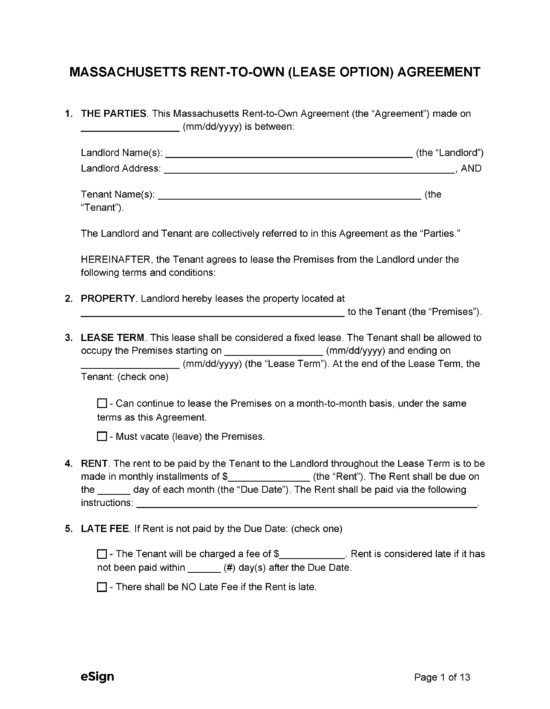 Rent-to-Own Agreement (Lease Option) – A lease-to-own agreement gives the tenant the opportunity to purchase the property before the term ends. Rent-to-Own Agreement (Lease Option) – A lease-to-own agreement gives the tenant the opportunity to purchase the property before the term ends.
Download: PDF |
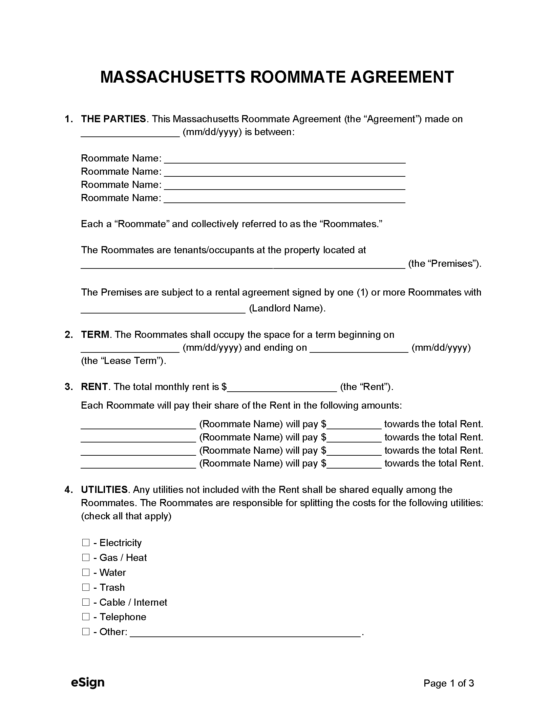 Roommate Agreement – A roommate agreement is made between individuals who live in the same residential property to outline the rules and conditions for living together. Roommate Agreement – A roommate agreement is made between individuals who live in the same residential property to outline the rules and conditions for living together.
Download: PDF, Word (.docx), OpenDocument |
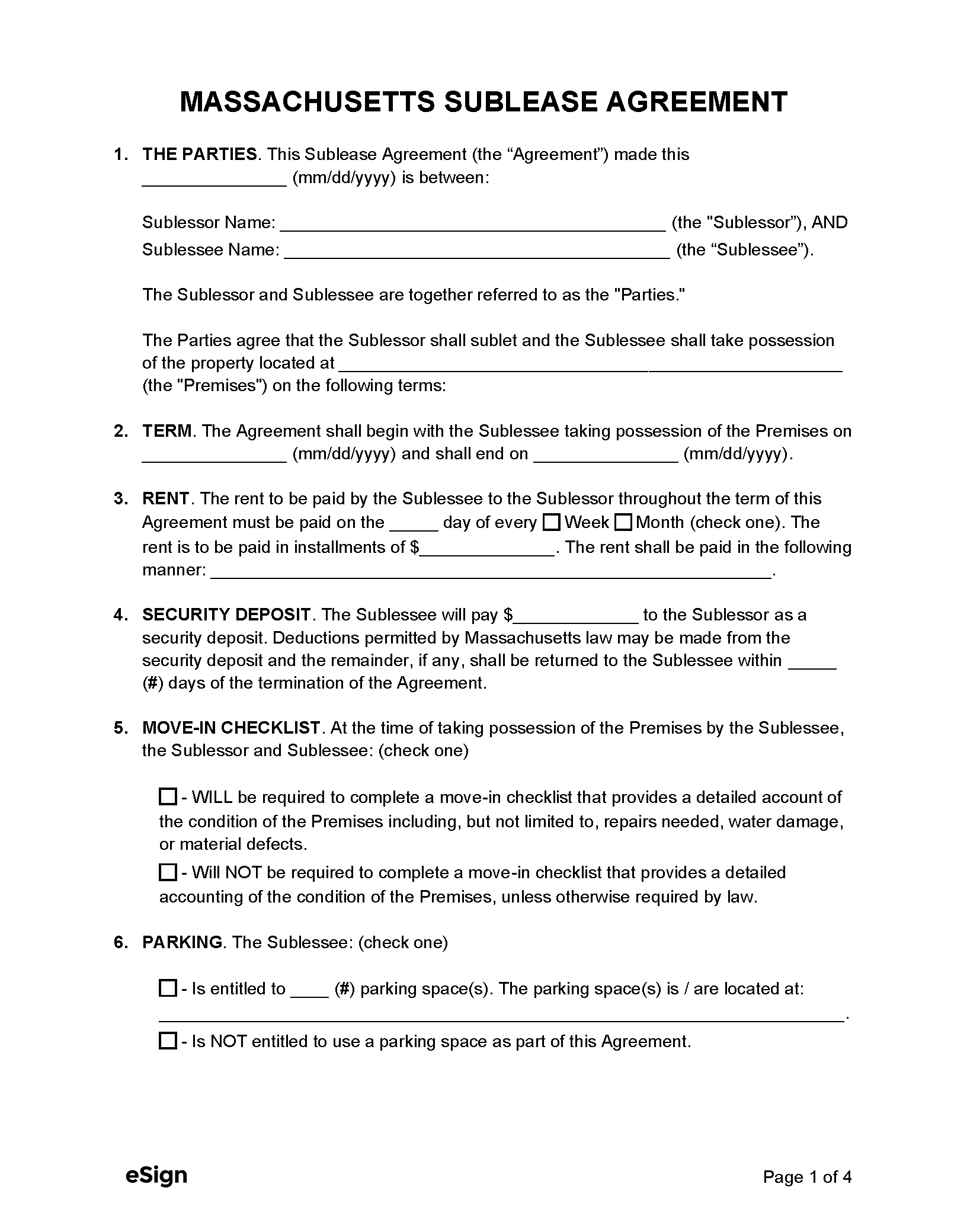 Sublease Agreement – A sublease agreement allows a tenant to sublet all or a part of their rental unit to a sublessor with permission from the landlord. Sublease Agreement – A sublease agreement allows a tenant to sublet all or a part of their rental unit to a sublessor with permission from the landlord.
Download: PDF, Word (.docx), OpenDocument |
Required Disclosures (4)
- Fire Insurance – At the tenant’s request, the landlord must provide the name of the company insuring against fire damage, the amount of coverage, and the name of the person who would receive the insurance payment.[1]
- Lead-Based Paint Disclosure (PDF)- Federal law requires that all landlords provide tenants a lead-based paint disclosure if the rental property was built before 1978.[2]
- Security Deposit Receipt – After providing a security deposit, the tenant must receive a receipt from the landlord that shows the amount deposited, the payment date, the landlord’s name, and a description of the property.[3]
- Security Deposit Account – Within 30 days of receiving a security deposit, a landlord must provide a receipt to the tenant detailing the name and location of the bank, the account number, and the amount deposited.[4]
- Statement of Condition (PDF) – If a landlord demands a security deposit from the tenant, it is mandatory that they provide a statement that lists the condition of the apartment prior to the move-in date.[5]
Security Deposits
Maximum Amount ($) – The maximum security deposit amount cannot be more than one month’s rent.[6]
Collecting Interest – When holding a security deposit for at least one year, a landlord must make annual interest payments to the tenant in the amount of 5% or whatever lower amount is paid from the bank where the deposit is held.[7]
- Exception – If the lease terminates before the end of the term, the tenant is owed interest accrued only up to that point, to be paid within 30 days of termination.
Returning to Tenant – Security deposits must be returned to tenants within 30 days of the lease termination date.[8]
Itemized List Required? – Yes, if the landlord withholds some of the security deposit for damages, they must provide an itemized list of damages to the tenant within 30 days of the lease termination date.[9]
Separate Bank Account? – Yes, the security deposit held by the landlord must be kept in a separate, interest-bearing account.[10]
Landlord’s Entry
General Access – A lease can contain a clause allowing the landlord to enter for inspections, repairs, and showing to prospective tenants, but there is no mention in state law of advance notice that must be given.[11]
Immediate Access – Landlords do not need to give notice to enter in an emergency.
Rent Payments
Grace Period – Landlords may not charge a fee for late rent until 30 days have passed since the due date.[12]
Maximum Late Fee ($) – There is no maximum late rent fee outlined in state law.
Bad Check (NSF) Fee – State statutes do not mention fees for rent checks that bounce due to insufficient funds.
Withholding Rent – A tenant may have the right to withhold rent if the landlord has failed to comply with their obligations, as long as the tenant provides notice and time to fix the issue.[13]
Breaking a Lease
Non-Payment of Rent – If rent is not paid by the end of the 30-day grace period has ended, the landlord can send the tenant a 14-day notice to quit to force them to pay within the notice period or face eviction.[14]
- Exception: Non-payment of rent by at-will tenants means the landlord must provide a notice to quit that gives the tenant 10 days to make the rent payment or vacate the premises within 14 days.[15]
Non-Compliance – There is no statutory notice period that landlords must provide to tenants to cure a non-compliance.
- Exception: For tenancies-at-will, the notice period for non-compliance is 30 days or one rental period, whichever is longer.
Lockouts – Landlords who have forced a tenant out of their rental property unlawfully may be fined, imprisoned, or liable for damages.[16]
Leaving Before the End Date – State statutes don’t mention what happens if a tenant abandons their rental property.
Lease Termination
Month-to-Month – Either party may terminate an at-will monthly lease by providing the other with 30 days’ notice or one rent period, whichever is longer.[17]
Unclaimed Property – Any personal property of the tenant left on the rental property once the landlord regains possession after an eviction should be stored at the cost of the tenant and can be sold if not claimed after six months.[18]
Sources
- Ch. 186 § 21
- EPA/HUD Fact Sheet
- Ch. 186 § 15B(2)(b)
- Ch. 186 § 15B(3)(a)
- Ch. 186 § 15B(2)(c)
- Ch. 186 § 15B(1)(b)(iii)
- Ch. 186 § 15B(3)(b)
- Ch. 186 § 15B(4)
- Ch. 186 § 15B(4)(iii)
- Ch. 186 § 15B(3)(a)
- Ch. 186 § 15B(1)(a)
- Ch. 186 § 15B(1)(c)
- Ch. 239 § 8A
- Ch. 186 § 11
- Ch. 186 § 12
- Ch. 186 § 14
- Ch. 186 § 12
- Ch. 239 § 4
